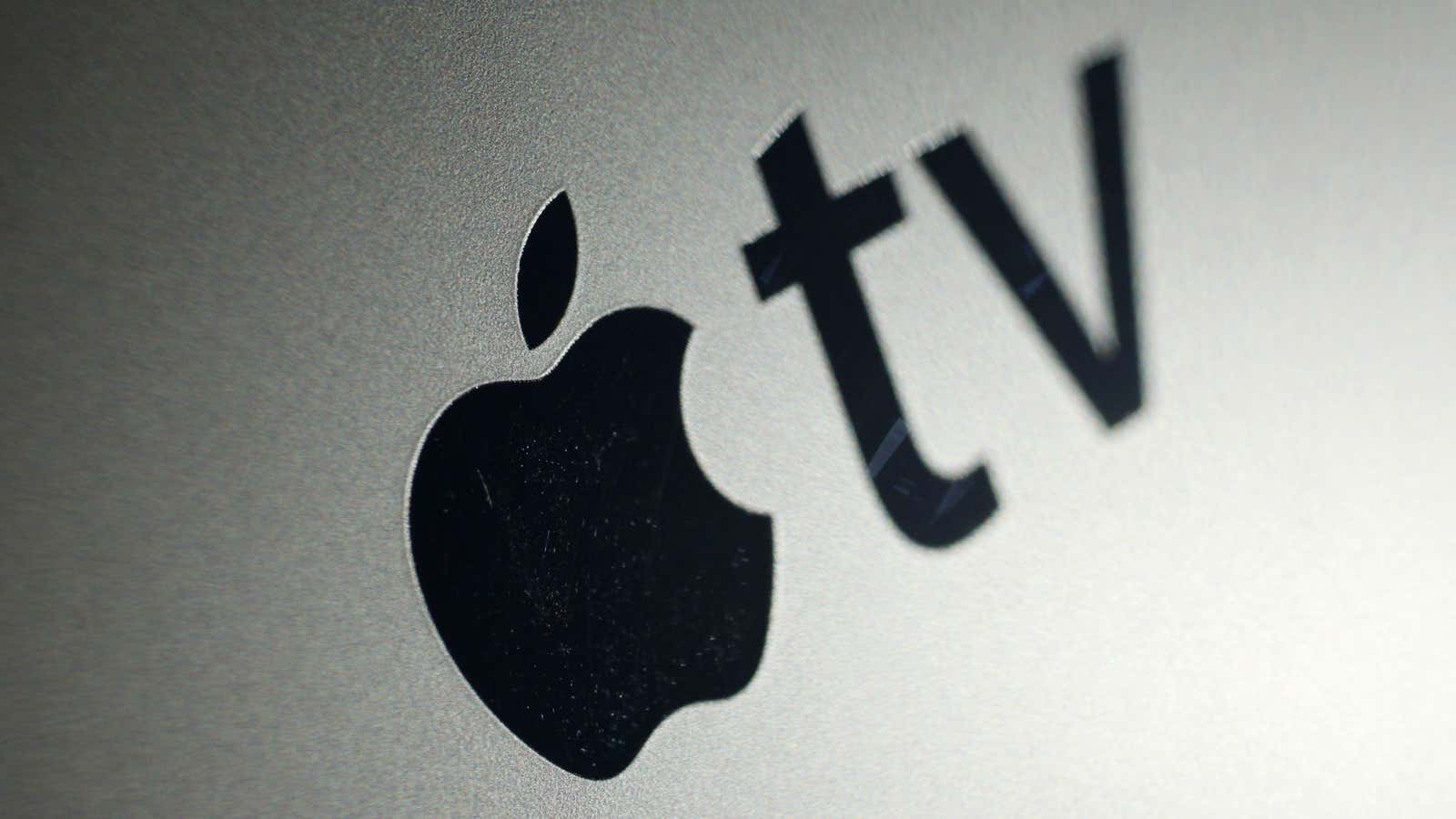So Apple is reportedly talking to programmers about starting its own internet TV service. Haven’t we heard that before?
We have! In fact, we’ve heard it numerous times before. Apple has been trying to get into the TV business for years.
Why haven’t they been successful?
Well, there are a few reasons. Initially, Apple hoped to strike deals with pay TV companies—Comcast, Time Warner Cable, etc.—to connect their pipes into an Apple device, bypassing the cable box altogether. This was somewhat enticing to cable companies, because Apple’s prominence in the consumer electronics market could help them stem the loss of customers to cord-cutting.
But the pay TV companies feared ceding control of their customers, and were turned off by the idea of merely providing the lines with which networks would give their content directly to Apple. All in all, it looks like going the cable route for Apple is a dead end.
So what about partnering with the networks, like Disney or HBO, instead?
Apple has tried to do that, too. Bypassing cable companies altogether and providing content over-the-top (OTT) on the internet was an unproven idea only a few years ago. Content providers didn’t think there was a viable business in the internet. But frustrated with hitting a dead end with pay TV companies, Apple figured it would try to go after the programmers.
This hit a snag, too. Apple couldn’t make deals with enough networks to make its own service seem worth it.
But shouldn’t the networks be begging Apple to take their content? Dish’s new Sling TV box offers a bunch of good channels over the internet, including ESPN!
It’s not that simple. Apple, in all likelihood, is asking a bit more out of the networks than Dish did. One of Sling’s drawbacks is that its on-demand options are limited. Apple probably wants much more extensive rights to video-on-demand (VOD) and the ability to record content in the cloud.
Huh?
Imagine you are Fox, which owns the cable channel FX. With acclaimed shows like The Americans, Fargo, and Louie, FX is a really lucrative channel that any potential OTT service would want to have. As FX’s reputation rises, Fox can charge traditional pay TV services more and more to carry FX. But if Fox gets all willy nilly and starts licensing FX to companies like Apple, it loses leverage in those negotiations.
So, it might not even be worth it financially for networks to license their shows to Apple.
Exactly. But that’s not the only reason they’d be hesitant to do so. For instance, FX currently licenses many of its shows to Amazon Prime Instant Video. If that’s an exclusive contract, Fox isn’t even allowed to license its content anywhere else.
Not to mention, Fox is probably toying with the idea of going over-the-top themselves, circumventing any external distributor altogether (like CBS is doing). Fox looks at its library of content and says, “Hey, we’ve got a lot of cool stuff, we could offer it directly to customers without having to deal with anyone else, maybe we should look into that.”
While partnering with Apple can be an interesting opportunity, it’s not a sure slam dunk, and it could be leaving better opportunities on the table.
So, in this hypothetical Fox example, Fox needs to be selective with whom they license stuff to, otherwise they can’t negotiate higher fees with cable companies. And if they’re going to be selective, then they’re safer partnering with a service like Sling TV which doesn’t require extensive on-demand rights.
You’re really getting it now.
Thanks. So what has changed for Apple now? Why might the company finally fulfill its TV dream now, after all these years of failing?
First of all, stop saying “so.” A lot has changed in the industry in just two years. With services like Sling TV, internet television is a reality. It’s no longer an unprecedented, dubious technology.
Plus, the FCC has signaled that it will change its rule to effectively make platforms like Sling TV, or a potential Apple internet TV service, the same as any other pay-TV service. A few years ago, going over-the-top might have seriously damaged programmers’ relationships with cable companies, but now it’s not as big of a deal.
Hold on a second. How would this be any different than Apple TV?
True, it’s confusing. This potential product would host a variety of channels and allow you to watch them directly through Apple. The current Apple TV only takes channels you already pay for through other means (like, say, HBO Go that you own via your cable subscription) and puts them onto your television set.
Do you think it’ll happen this time? Is Apple going to finally get into the TV business? Will it take over Hollywood like it took over the music industry with iTunes?!
We’ll just have to wait and see. It’s far from set in stone, but the conditions seem to be right, and the whispers we’re hearing are encouraging.
How much will it cost?
Now you’re really just getting ahead of yourself. But, for reference, Sling TV contains 12 channels and costs $20 per month. The average US cable TV bill is roughly $76.
